Understanding Organisational Change Management
VerifiedAdded on 2020/06/04
|14
|4031
|55
AI Summary
This assignment delves into the critical field of organisational change management. It examines various theoretical frameworks used to understand and implement change, analyzing factors contributing to resistance and outlining effective strategies for overcoming it. The focus is on practical applications, drawing upon real-world case studies and academic research to demonstrate successful change implementation in diverse organizational contexts.
Contribute Materials
Your contribution can guide someone’s learning journey. Share your
documents today.
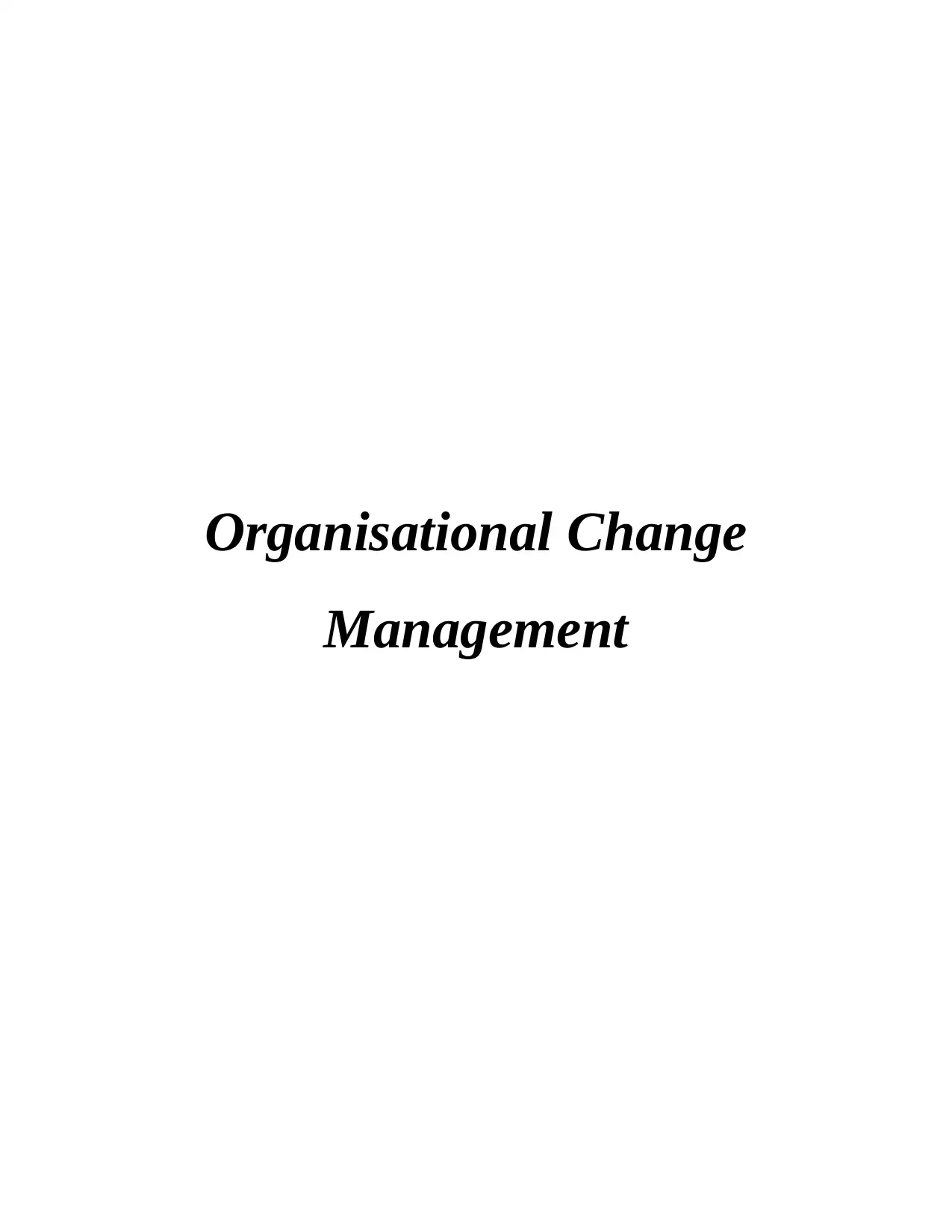
Organisational Change
Management
Management
Secure Best Marks with AI Grader
Need help grading? Try our AI Grader for instant feedback on your assignments.
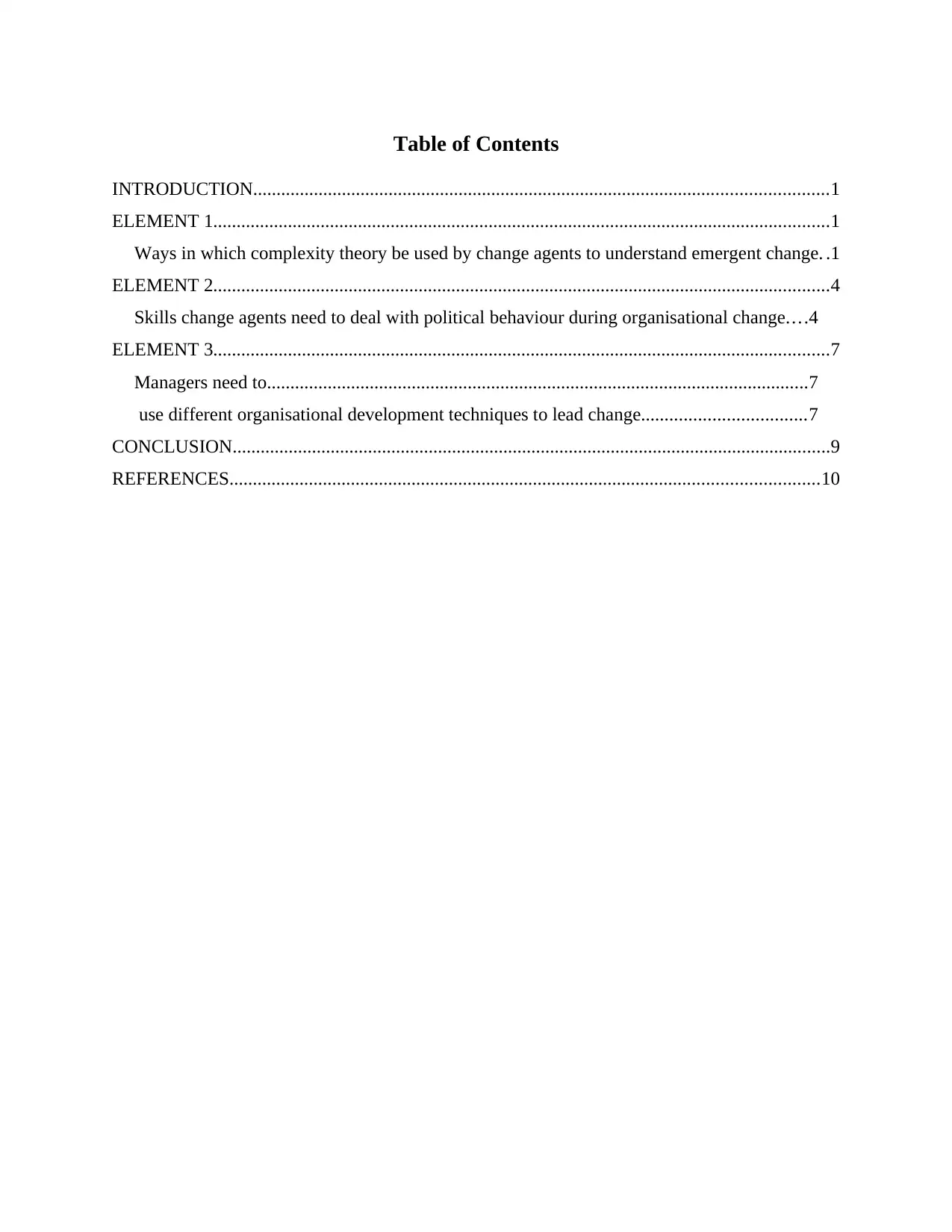
Table of Contents
INTRODUCTION...........................................................................................................................1
ELEMENT 1....................................................................................................................................1
Ways in which complexity theory be used by change agents to understand emergent change. .1
ELEMENT 2....................................................................................................................................4
Skills change agents need to deal with political behaviour during organisational change....4
ELEMENT 3....................................................................................................................................7
Managers need to....................................................................................................................7
use different organisational development techniques to lead change...................................7
CONCLUSION................................................................................................................................9
REFERENCES..............................................................................................................................10
INTRODUCTION...........................................................................................................................1
ELEMENT 1....................................................................................................................................1
Ways in which complexity theory be used by change agents to understand emergent change. .1
ELEMENT 2....................................................................................................................................4
Skills change agents need to deal with political behaviour during organisational change....4
ELEMENT 3....................................................................................................................................7
Managers need to....................................................................................................................7
use different organisational development techniques to lead change...................................7
CONCLUSION................................................................................................................................9
REFERENCES..............................................................................................................................10

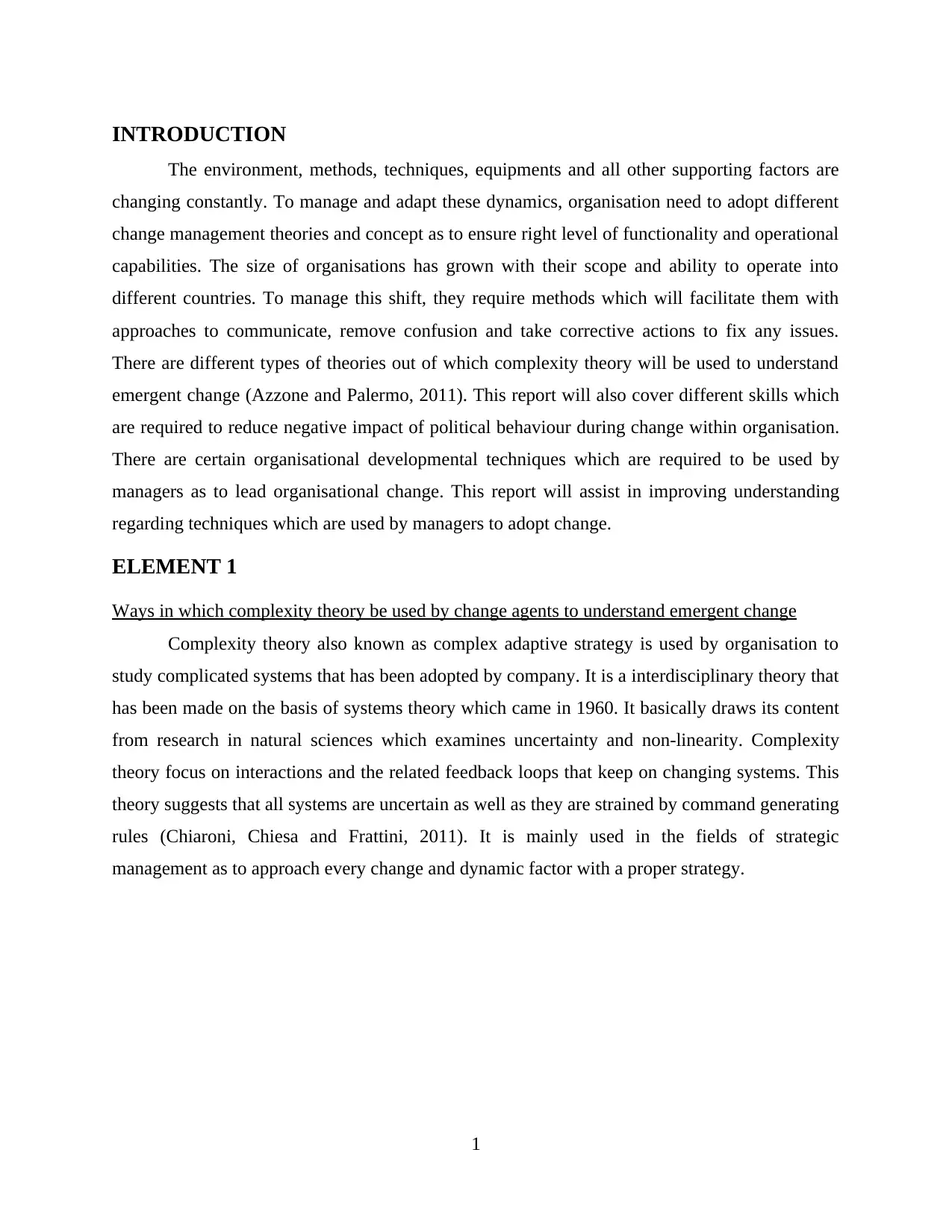
INTRODUCTION
The environment, methods, techniques, equipments and all other supporting factors are
changing constantly. To manage and adapt these dynamics, organisation need to adopt different
change management theories and concept as to ensure right level of functionality and operational
capabilities. The size of organisations has grown with their scope and ability to operate into
different countries. To manage this shift, they require methods which will facilitate them with
approaches to communicate, remove confusion and take corrective actions to fix any issues.
There are different types of theories out of which complexity theory will be used to understand
emergent change (Azzone and Palermo, 2011). This report will also cover different skills which
are required to reduce negative impact of political behaviour during change within organisation.
There are certain organisational developmental techniques which are required to be used by
managers as to lead organisational change. This report will assist in improving understanding
regarding techniques which are used by managers to adopt change.
ELEMENT 1
Ways in which complexity theory be used by change agents to understand emergent change
Complexity theory also known as complex adaptive strategy is used by organisation to
study complicated systems that has been adopted by company. It is a interdisciplinary theory that
has been made on the basis of systems theory which came in 1960. It basically draws its content
from research in natural sciences which examines uncertainty and non-linearity. Complexity
theory focus on interactions and the related feedback loops that keep on changing systems. This
theory suggests that all systems are uncertain as well as they are strained by command generating
rules (Chiaroni, Chiesa and Frattini, 2011). It is mainly used in the fields of strategic
management as to approach every change and dynamic factor with a proper strategy.
1
The environment, methods, techniques, equipments and all other supporting factors are
changing constantly. To manage and adapt these dynamics, organisation need to adopt different
change management theories and concept as to ensure right level of functionality and operational
capabilities. The size of organisations has grown with their scope and ability to operate into
different countries. To manage this shift, they require methods which will facilitate them with
approaches to communicate, remove confusion and take corrective actions to fix any issues.
There are different types of theories out of which complexity theory will be used to understand
emergent change (Azzone and Palermo, 2011). This report will also cover different skills which
are required to reduce negative impact of political behaviour during change within organisation.
There are certain organisational developmental techniques which are required to be used by
managers as to lead organisational change. This report will assist in improving understanding
regarding techniques which are used by managers to adopt change.
ELEMENT 1
Ways in which complexity theory be used by change agents to understand emergent change
Complexity theory also known as complex adaptive strategy is used by organisation to
study complicated systems that has been adopted by company. It is a interdisciplinary theory that
has been made on the basis of systems theory which came in 1960. It basically draws its content
from research in natural sciences which examines uncertainty and non-linearity. Complexity
theory focus on interactions and the related feedback loops that keep on changing systems. This
theory suggests that all systems are uncertain as well as they are strained by command generating
rules (Chiaroni, Chiesa and Frattini, 2011). It is mainly used in the fields of strategic
management as to approach every change and dynamic factor with a proper strategy.
1
Secure Best Marks with AI Grader
Need help grading? Try our AI Grader for instant feedback on your assignments.
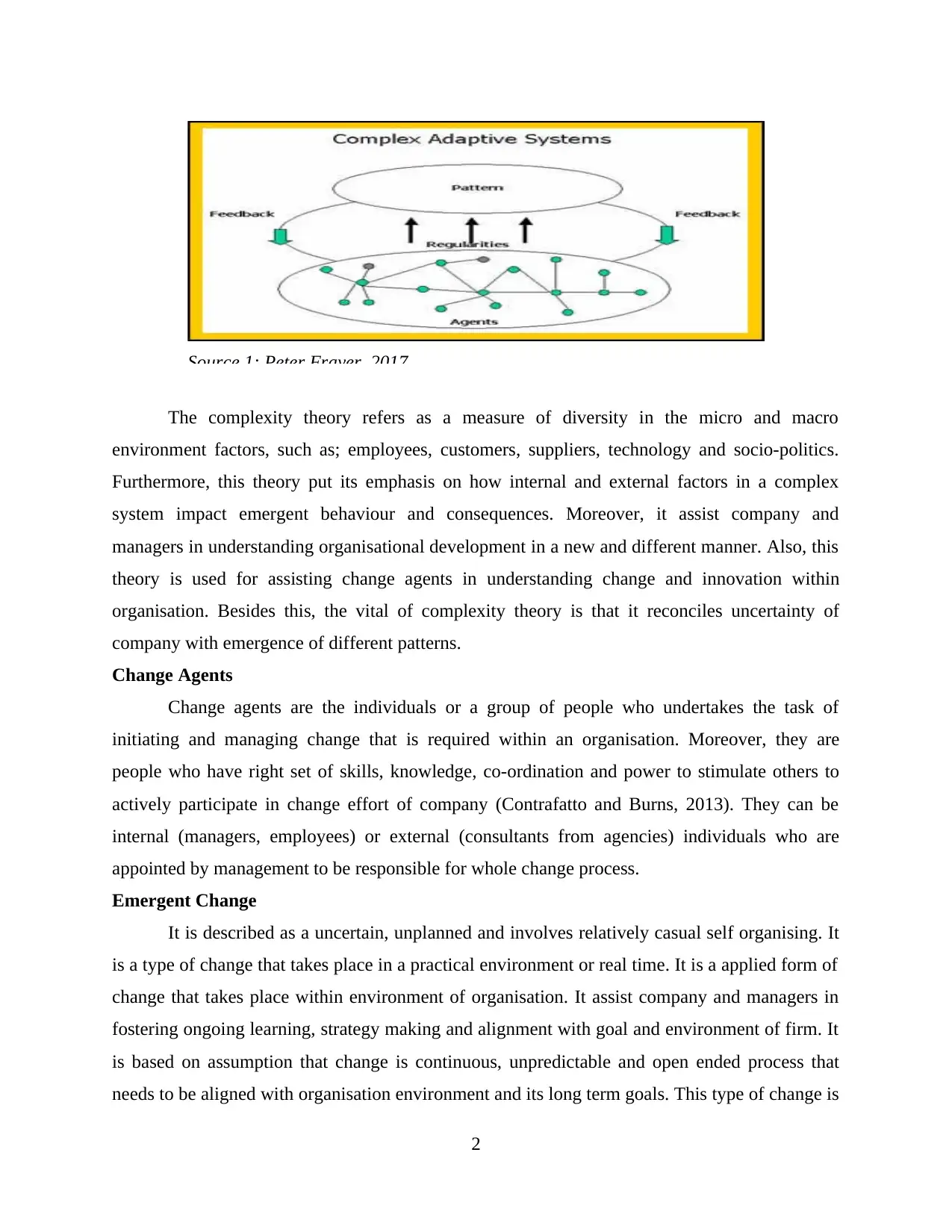
The complexity theory refers as a measure of diversity in the micro and macro
environment factors, such as; employees, customers, suppliers, technology and socio-politics.
Furthermore, this theory put its emphasis on how internal and external factors in a complex
system impact emergent behaviour and consequences. Moreover, it assist company and
managers in understanding organisational development in a new and different manner. Also, this
theory is used for assisting change agents in understanding change and innovation within
organisation. Besides this, the vital of complexity theory is that it reconciles uncertainty of
company with emergence of different patterns.
Change Agents
Change agents are the individuals or a group of people who undertakes the task of
initiating and managing change that is required within an organisation. Moreover, they are
people who have right set of skills, knowledge, co-ordination and power to stimulate others to
actively participate in change effort of company (Contrafatto and Burns, 2013). They can be
internal (managers, employees) or external (consultants from agencies) individuals who are
appointed by management to be responsible for whole change process.
Emergent Change
It is described as a uncertain, unplanned and involves relatively casual self organising. It
is a type of change that takes place in a practical environment or real time. It is a applied form of
change that takes place within environment of organisation. It assist company and managers in
fostering ongoing learning, strategy making and alignment with goal and environment of firm. It
is based on assumption that change is continuous, unpredictable and open ended process that
needs to be aligned with organisation environment and its long term goals. This type of change is
2
Source 1: Peter Frayer, 2017
environment factors, such as; employees, customers, suppliers, technology and socio-politics.
Furthermore, this theory put its emphasis on how internal and external factors in a complex
system impact emergent behaviour and consequences. Moreover, it assist company and
managers in understanding organisational development in a new and different manner. Also, this
theory is used for assisting change agents in understanding change and innovation within
organisation. Besides this, the vital of complexity theory is that it reconciles uncertainty of
company with emergence of different patterns.
Change Agents
Change agents are the individuals or a group of people who undertakes the task of
initiating and managing change that is required within an organisation. Moreover, they are
people who have right set of skills, knowledge, co-ordination and power to stimulate others to
actively participate in change effort of company (Contrafatto and Burns, 2013). They can be
internal (managers, employees) or external (consultants from agencies) individuals who are
appointed by management to be responsible for whole change process.
Emergent Change
It is described as a uncertain, unplanned and involves relatively casual self organising. It
is a type of change that takes place in a practical environment or real time. It is a applied form of
change that takes place within environment of organisation. It assist company and managers in
fostering ongoing learning, strategy making and alignment with goal and environment of firm. It
is based on assumption that change is continuous, unpredictable and open ended process that
needs to be aligned with organisation environment and its long term goals. This type of change is
2
Source 1: Peter Frayer, 2017
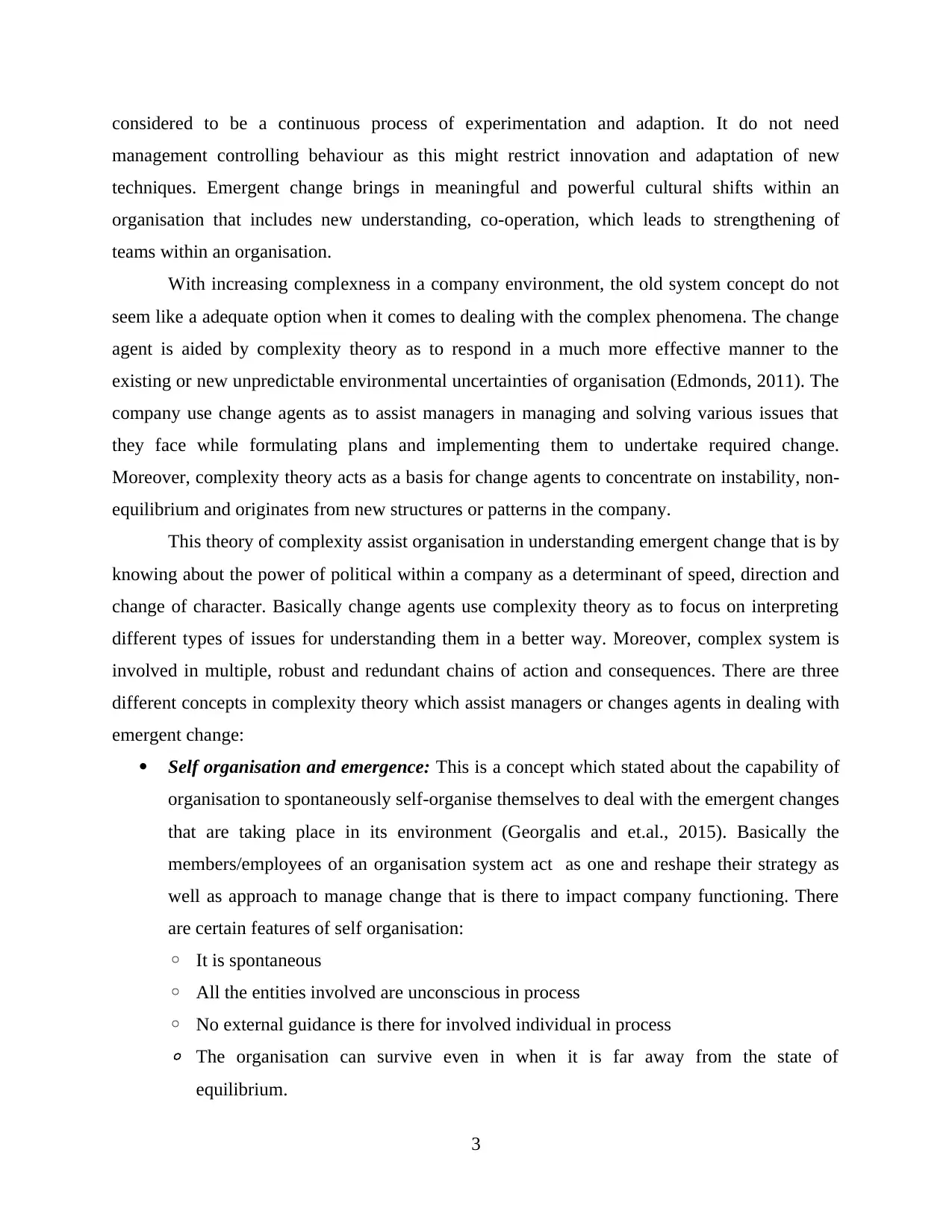
considered to be a continuous process of experimentation and adaption. It do not need
management controlling behaviour as this might restrict innovation and adaptation of new
techniques. Emergent change brings in meaningful and powerful cultural shifts within an
organisation that includes new understanding, co-operation, which leads to strengthening of
teams within an organisation.
With increasing complexness in a company environment, the old system concept do not
seem like a adequate option when it comes to dealing with the complex phenomena. The change
agent is aided by complexity theory as to respond in a much more effective manner to the
existing or new unpredictable environmental uncertainties of organisation (Edmonds, 2011). The
company use change agents as to assist managers in managing and solving various issues that
they face while formulating plans and implementing them to undertake required change.
Moreover, complexity theory acts as a basis for change agents to concentrate on instability, non-
equilibrium and originates from new structures or patterns in the company.
This theory of complexity assist organisation in understanding emergent change that is by
knowing about the power of political within a company as a determinant of speed, direction and
change of character. Basically change agents use complexity theory as to focus on interpreting
different types of issues for understanding them in a better way. Moreover, complex system is
involved in multiple, robust and redundant chains of action and consequences. There are three
different concepts in complexity theory which assist managers or changes agents in dealing with
emergent change:
Self organisation and emergence: This is a concept which stated about the capability of
organisation to spontaneously self-organise themselves to deal with the emergent changes
that are taking place in its environment (Georgalis and et.al., 2015). Basically the
members/employees of an organisation system act as one and reshape their strategy as
well as approach to manage change that is there to impact company functioning. There
are certain features of self organisation:
◦ It is spontaneous
◦ All the entities involved are unconscious in process
◦ No external guidance is there for involved individual in process
◦ The organisation can survive even in when it is far away from the state of
equilibrium.
3
management controlling behaviour as this might restrict innovation and adaptation of new
techniques. Emergent change brings in meaningful and powerful cultural shifts within an
organisation that includes new understanding, co-operation, which leads to strengthening of
teams within an organisation.
With increasing complexness in a company environment, the old system concept do not
seem like a adequate option when it comes to dealing with the complex phenomena. The change
agent is aided by complexity theory as to respond in a much more effective manner to the
existing or new unpredictable environmental uncertainties of organisation (Edmonds, 2011). The
company use change agents as to assist managers in managing and solving various issues that
they face while formulating plans and implementing them to undertake required change.
Moreover, complexity theory acts as a basis for change agents to concentrate on instability, non-
equilibrium and originates from new structures or patterns in the company.
This theory of complexity assist organisation in understanding emergent change that is by
knowing about the power of political within a company as a determinant of speed, direction and
change of character. Basically change agents use complexity theory as to focus on interpreting
different types of issues for understanding them in a better way. Moreover, complex system is
involved in multiple, robust and redundant chains of action and consequences. There are three
different concepts in complexity theory which assist managers or changes agents in dealing with
emergent change:
Self organisation and emergence: This is a concept which stated about the capability of
organisation to spontaneously self-organise themselves to deal with the emergent changes
that are taking place in its environment (Georgalis and et.al., 2015). Basically the
members/employees of an organisation system act as one and reshape their strategy as
well as approach to manage change that is there to impact company functioning. There
are certain features of self organisation:
◦ It is spontaneous
◦ All the entities involved are unconscious in process
◦ No external guidance is there for involved individual in process
◦ The organisation can survive even in when it is far away from the state of
equilibrium.
3
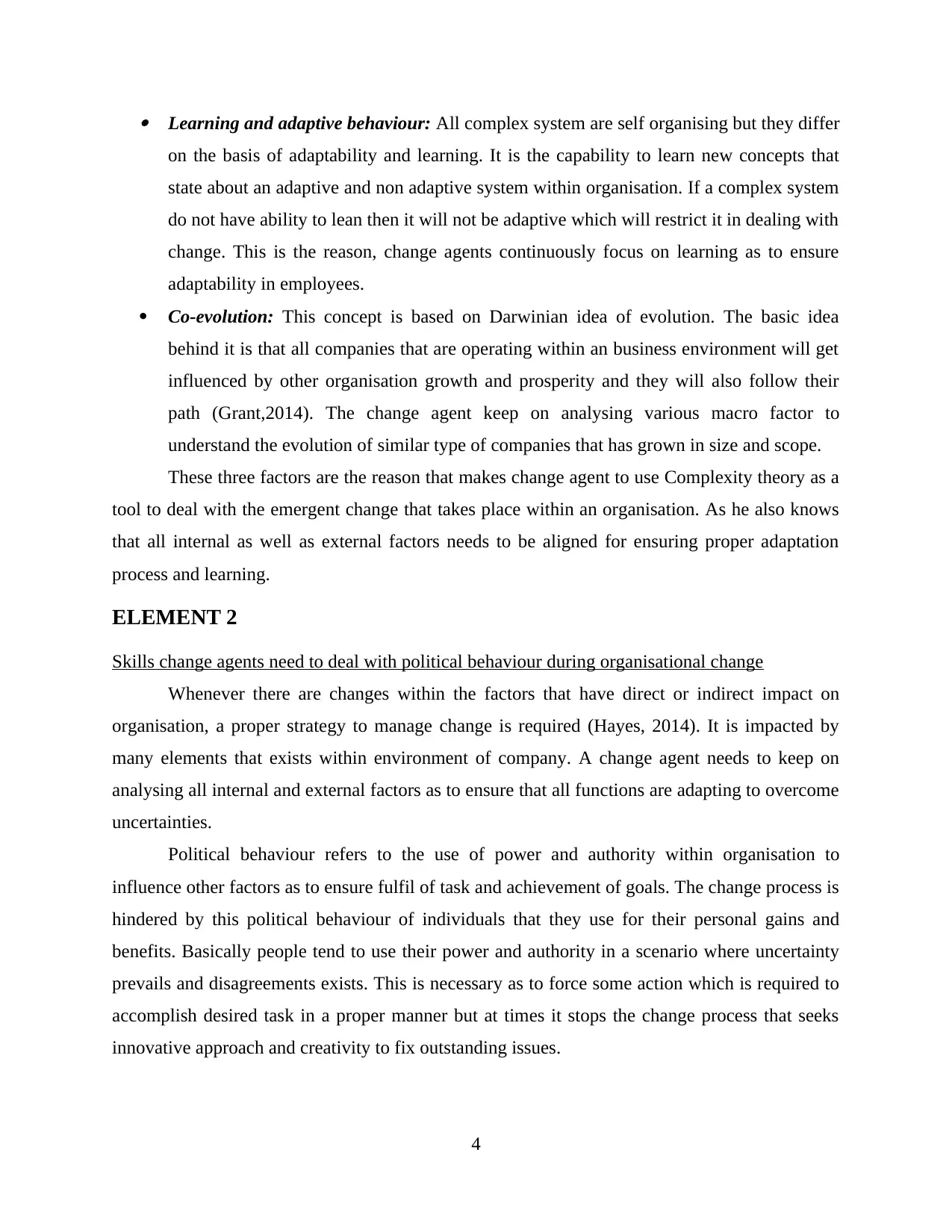
Learning and adaptive behaviour: All complex system are self organising but they differ
on the basis of adaptability and learning. It is the capability to learn new concepts that
state about an adaptive and non adaptive system within organisation. If a complex system
do not have ability to lean then it will not be adaptive which will restrict it in dealing with
change. This is the reason, change agents continuously focus on learning as to ensure
adaptability in employees.
Co-evolution: This concept is based on Darwinian idea of evolution. The basic idea
behind it is that all companies that are operating within an business environment will get
influenced by other organisation growth and prosperity and they will also follow their
path (Grant,2014). The change agent keep on analysing various macro factor to
understand the evolution of similar type of companies that has grown in size and scope.
These three factors are the reason that makes change agent to use Complexity theory as a
tool to deal with the emergent change that takes place within an organisation. As he also knows
that all internal as well as external factors needs to be aligned for ensuring proper adaptation
process and learning.
ELEMENT 2
Skills change agents need to deal with political behaviour during organisational change
Whenever there are changes within the factors that have direct or indirect impact on
organisation, a proper strategy to manage change is required (Hayes, 2014). It is impacted by
many elements that exists within environment of company. A change agent needs to keep on
analysing all internal and external factors as to ensure that all functions are adapting to overcome
uncertainties.
Political behaviour refers to the use of power and authority within organisation to
influence other factors as to ensure fulfil of task and achievement of goals. The change process is
hindered by this political behaviour of individuals that they use for their personal gains and
benefits. Basically people tend to use their power and authority in a scenario where uncertainty
prevails and disagreements exists. This is necessary as to force some action which is required to
accomplish desired task in a proper manner but at times it stops the change process that seeks
innovative approach and creativity to fix outstanding issues.
4
on the basis of adaptability and learning. It is the capability to learn new concepts that
state about an adaptive and non adaptive system within organisation. If a complex system
do not have ability to lean then it will not be adaptive which will restrict it in dealing with
change. This is the reason, change agents continuously focus on learning as to ensure
adaptability in employees.
Co-evolution: This concept is based on Darwinian idea of evolution. The basic idea
behind it is that all companies that are operating within an business environment will get
influenced by other organisation growth and prosperity and they will also follow their
path (Grant,2014). The change agent keep on analysing various macro factor to
understand the evolution of similar type of companies that has grown in size and scope.
These three factors are the reason that makes change agent to use Complexity theory as a
tool to deal with the emergent change that takes place within an organisation. As he also knows
that all internal as well as external factors needs to be aligned for ensuring proper adaptation
process and learning.
ELEMENT 2
Skills change agents need to deal with political behaviour during organisational change
Whenever there are changes within the factors that have direct or indirect impact on
organisation, a proper strategy to manage change is required (Hayes, 2014). It is impacted by
many elements that exists within environment of company. A change agent needs to keep on
analysing all internal and external factors as to ensure that all functions are adapting to overcome
uncertainties.
Political behaviour refers to the use of power and authority within organisation to
influence other factors as to ensure fulfil of task and achievement of goals. The change process is
hindered by this political behaviour of individuals that they use for their personal gains and
benefits. Basically people tend to use their power and authority in a scenario where uncertainty
prevails and disagreements exists. This is necessary as to force some action which is required to
accomplish desired task in a proper manner but at times it stops the change process that seeks
innovative approach and creativity to fix outstanding issues.
4
Paraphrase This Document
Need a fresh take? Get an instant paraphrase of this document with our AI Paraphraser
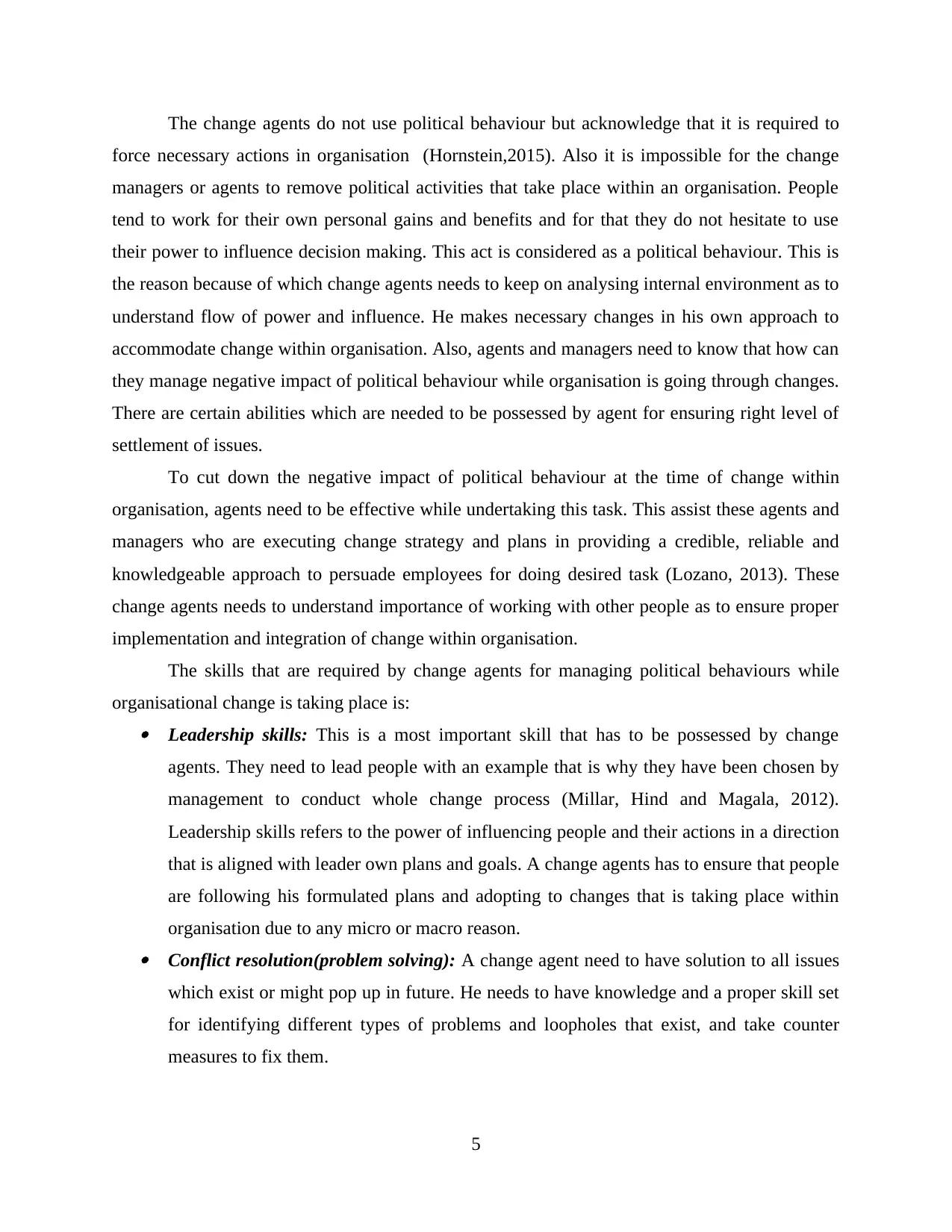
The change agents do not use political behaviour but acknowledge that it is required to
force necessary actions in organisation (Hornstein,2015). Also it is impossible for the change
managers or agents to remove political activities that take place within an organisation. People
tend to work for their own personal gains and benefits and for that they do not hesitate to use
their power to influence decision making. This act is considered as a political behaviour. This is
the reason because of which change agents needs to keep on analysing internal environment as to
understand flow of power and influence. He makes necessary changes in his own approach to
accommodate change within organisation. Also, agents and managers need to know that how can
they manage negative impact of political behaviour while organisation is going through changes.
There are certain abilities which are needed to be possessed by agent for ensuring right level of
settlement of issues.
To cut down the negative impact of political behaviour at the time of change within
organisation, agents need to be effective while undertaking this task. This assist these agents and
managers who are executing change strategy and plans in providing a credible, reliable and
knowledgeable approach to persuade employees for doing desired task (Lozano, 2013). These
change agents needs to understand importance of working with other people as to ensure proper
implementation and integration of change within organisation.
The skills that are required by change agents for managing political behaviours while
organisational change is taking place is: Leadership skills: This is a most important skill that has to be possessed by change
agents. They need to lead people with an example that is why they have been chosen by
management to conduct whole change process (Millar, Hind and Magala, 2012).
Leadership skills refers to the power of influencing people and their actions in a direction
that is aligned with leader own plans and goals. A change agents has to ensure that people
are following his formulated plans and adopting to changes that is taking place within
organisation due to any micro or macro reason. Conflict resolution(problem solving): A change agent need to have solution to all issues
which exist or might pop up in future. He needs to have knowledge and a proper skill set
for identifying different types of problems and loopholes that exist, and take counter
measures to fix them.
5
force necessary actions in organisation (Hornstein,2015). Also it is impossible for the change
managers or agents to remove political activities that take place within an organisation. People
tend to work for their own personal gains and benefits and for that they do not hesitate to use
their power to influence decision making. This act is considered as a political behaviour. This is
the reason because of which change agents needs to keep on analysing internal environment as to
understand flow of power and influence. He makes necessary changes in his own approach to
accommodate change within organisation. Also, agents and managers need to know that how can
they manage negative impact of political behaviour while organisation is going through changes.
There are certain abilities which are needed to be possessed by agent for ensuring right level of
settlement of issues.
To cut down the negative impact of political behaviour at the time of change within
organisation, agents need to be effective while undertaking this task. This assist these agents and
managers who are executing change strategy and plans in providing a credible, reliable and
knowledgeable approach to persuade employees for doing desired task (Lozano, 2013). These
change agents needs to understand importance of working with other people as to ensure proper
implementation and integration of change within organisation.
The skills that are required by change agents for managing political behaviours while
organisational change is taking place is: Leadership skills: This is a most important skill that has to be possessed by change
agents. They need to lead people with an example that is why they have been chosen by
management to conduct whole change process (Millar, Hind and Magala, 2012).
Leadership skills refers to the power of influencing people and their actions in a direction
that is aligned with leader own plans and goals. A change agents has to ensure that people
are following his formulated plans and adopting to changes that is taking place within
organisation due to any micro or macro reason. Conflict resolution(problem solving): A change agent need to have solution to all issues
which exist or might pop up in future. He needs to have knowledge and a proper skill set
for identifying different types of problems and loopholes that exist, and take counter
measures to fix them.
5
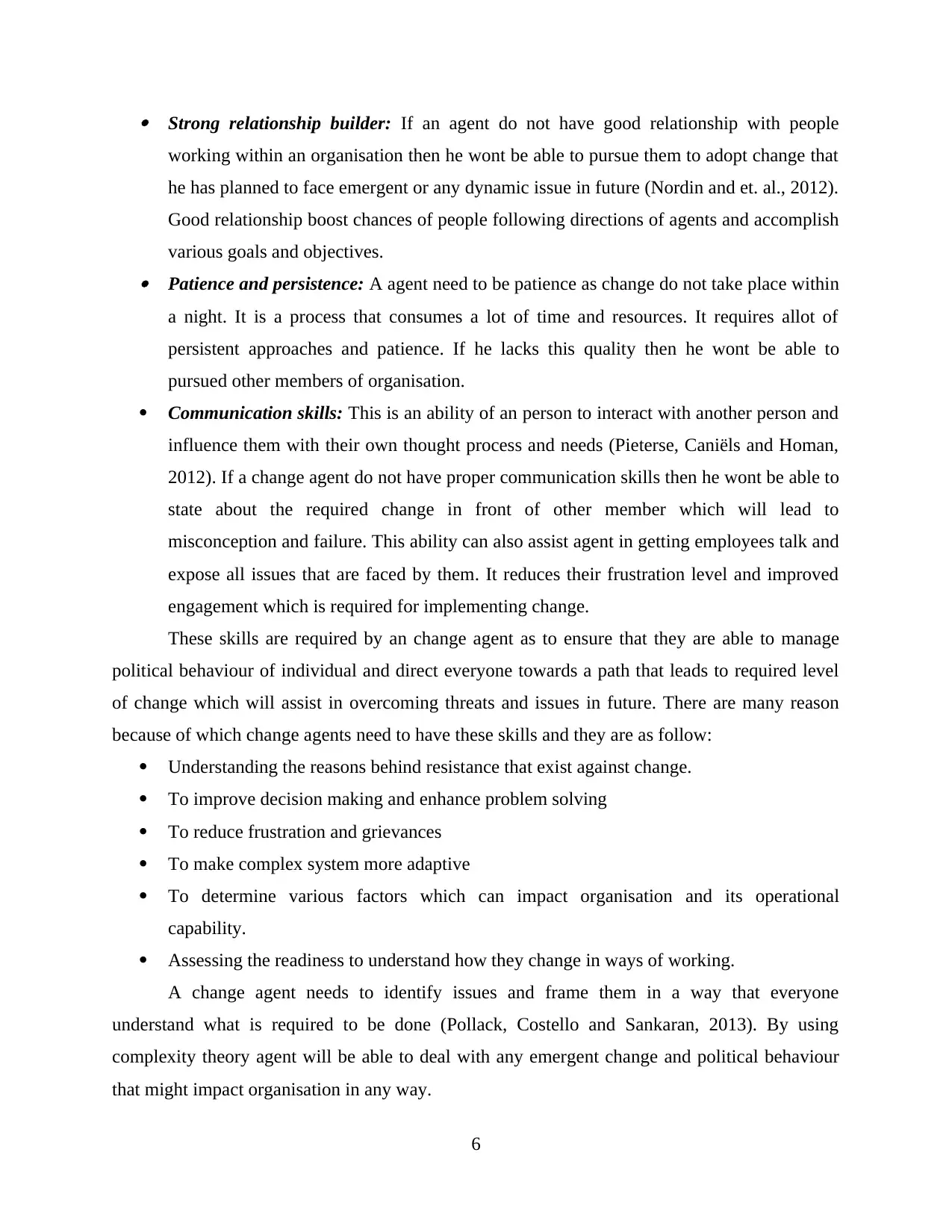
Strong relationship builder: If an agent do not have good relationship with people
working within an organisation then he wont be able to pursue them to adopt change that
he has planned to face emergent or any dynamic issue in future (Nordin and et. al., 2012).
Good relationship boost chances of people following directions of agents and accomplish
various goals and objectives. Patience and persistence: A agent need to be patience as change do not take place within
a night. It is a process that consumes a lot of time and resources. It requires allot of
persistent approaches and patience. If he lacks this quality then he wont be able to
pursued other members of organisation.
Communication skills: This is an ability of an person to interact with another person and
influence them with their own thought process and needs (Pieterse, Caniëls and Homan,
2012). If a change agent do not have proper communication skills then he wont be able to
state about the required change in front of other member which will lead to
misconception and failure. This ability can also assist agent in getting employees talk and
expose all issues that are faced by them. It reduces their frustration level and improved
engagement which is required for implementing change.
These skills are required by an change agent as to ensure that they are able to manage
political behaviour of individual and direct everyone towards a path that leads to required level
of change which will assist in overcoming threats and issues in future. There are many reason
because of which change agents need to have these skills and they are as follow:
Understanding the reasons behind resistance that exist against change.
To improve decision making and enhance problem solving
To reduce frustration and grievances
To make complex system more adaptive
To determine various factors which can impact organisation and its operational
capability.
Assessing the readiness to understand how they change in ways of working.
A change agent needs to identify issues and frame them in a way that everyone
understand what is required to be done (Pollack, Costello and Sankaran, 2013). By using
complexity theory agent will be able to deal with any emergent change and political behaviour
that might impact organisation in any way.
6
working within an organisation then he wont be able to pursue them to adopt change that
he has planned to face emergent or any dynamic issue in future (Nordin and et. al., 2012).
Good relationship boost chances of people following directions of agents and accomplish
various goals and objectives. Patience and persistence: A agent need to be patience as change do not take place within
a night. It is a process that consumes a lot of time and resources. It requires allot of
persistent approaches and patience. If he lacks this quality then he wont be able to
pursued other members of organisation.
Communication skills: This is an ability of an person to interact with another person and
influence them with their own thought process and needs (Pieterse, Caniëls and Homan,
2012). If a change agent do not have proper communication skills then he wont be able to
state about the required change in front of other member which will lead to
misconception and failure. This ability can also assist agent in getting employees talk and
expose all issues that are faced by them. It reduces their frustration level and improved
engagement which is required for implementing change.
These skills are required by an change agent as to ensure that they are able to manage
political behaviour of individual and direct everyone towards a path that leads to required level
of change which will assist in overcoming threats and issues in future. There are many reason
because of which change agents need to have these skills and they are as follow:
Understanding the reasons behind resistance that exist against change.
To improve decision making and enhance problem solving
To reduce frustration and grievances
To make complex system more adaptive
To determine various factors which can impact organisation and its operational
capability.
Assessing the readiness to understand how they change in ways of working.
A change agent needs to identify issues and frame them in a way that everyone
understand what is required to be done (Pollack, Costello and Sankaran, 2013). By using
complexity theory agent will be able to deal with any emergent change and political behaviour
that might impact organisation in any way.
6
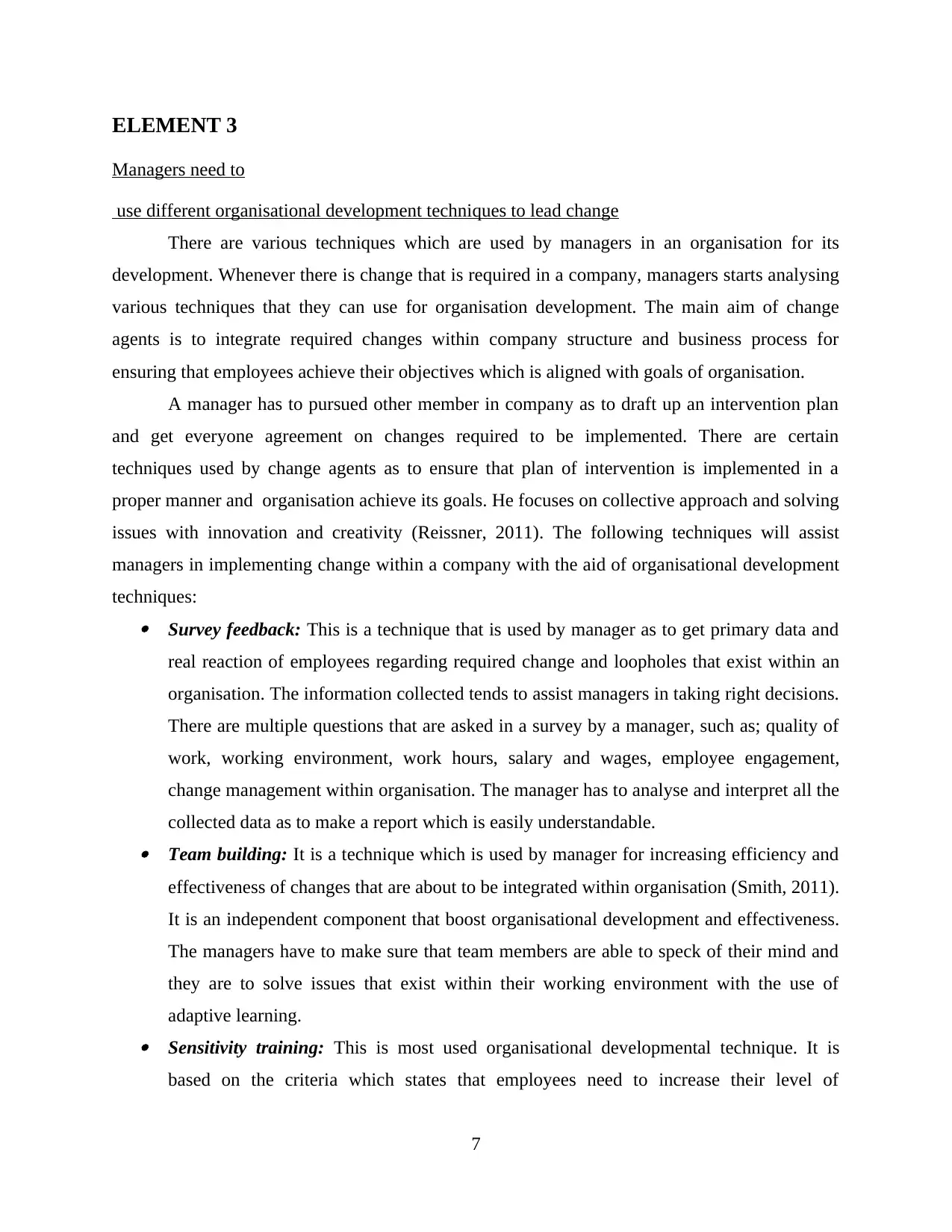
ELEMENT 3
Managers need to
use different organisational development techniques to lead change
There are various techniques which are used by managers in an organisation for its
development. Whenever there is change that is required in a company, managers starts analysing
various techniques that they can use for organisation development. The main aim of change
agents is to integrate required changes within company structure and business process for
ensuring that employees achieve their objectives which is aligned with goals of organisation.
A manager has to pursued other member in company as to draft up an intervention plan
and get everyone agreement on changes required to be implemented. There are certain
techniques used by change agents as to ensure that plan of intervention is implemented in a
proper manner and organisation achieve its goals. He focuses on collective approach and solving
issues with innovation and creativity (Reissner, 2011). The following techniques will assist
managers in implementing change within a company with the aid of organisational development
techniques: Survey feedback: This is a technique that is used by manager as to get primary data and
real reaction of employees regarding required change and loopholes that exist within an
organisation. The information collected tends to assist managers in taking right decisions.
There are multiple questions that are asked in a survey by a manager, such as; quality of
work, working environment, work hours, salary and wages, employee engagement,
change management within organisation. The manager has to analyse and interpret all the
collected data as to make a report which is easily understandable. Team building: It is a technique which is used by manager for increasing efficiency and
effectiveness of changes that are about to be integrated within organisation (Smith, 2011).
It is an independent component that boost organisational development and effectiveness.
The managers have to make sure that team members are able to speck of their mind and
they are to solve issues that exist within their working environment with the use of
adaptive learning. Sensitivity training: This is most used organisational developmental technique. It is
based on the criteria which states that employees need to increase their level of
7
Managers need to
use different organisational development techniques to lead change
There are various techniques which are used by managers in an organisation for its
development. Whenever there is change that is required in a company, managers starts analysing
various techniques that they can use for organisation development. The main aim of change
agents is to integrate required changes within company structure and business process for
ensuring that employees achieve their objectives which is aligned with goals of organisation.
A manager has to pursued other member in company as to draft up an intervention plan
and get everyone agreement on changes required to be implemented. There are certain
techniques used by change agents as to ensure that plan of intervention is implemented in a
proper manner and organisation achieve its goals. He focuses on collective approach and solving
issues with innovation and creativity (Reissner, 2011). The following techniques will assist
managers in implementing change within a company with the aid of organisational development
techniques: Survey feedback: This is a technique that is used by manager as to get primary data and
real reaction of employees regarding required change and loopholes that exist within an
organisation. The information collected tends to assist managers in taking right decisions.
There are multiple questions that are asked in a survey by a manager, such as; quality of
work, working environment, work hours, salary and wages, employee engagement,
change management within organisation. The manager has to analyse and interpret all the
collected data as to make a report which is easily understandable. Team building: It is a technique which is used by manager for increasing efficiency and
effectiveness of changes that are about to be integrated within organisation (Smith, 2011).
It is an independent component that boost organisational development and effectiveness.
The managers have to make sure that team members are able to speck of their mind and
they are to solve issues that exist within their working environment with the use of
adaptive learning. Sensitivity training: This is most used organisational developmental technique. It is
based on the criteria which states that employees need to increase their level of
7
Secure Best Marks with AI Grader
Need help grading? Try our AI Grader for instant feedback on your assignments.
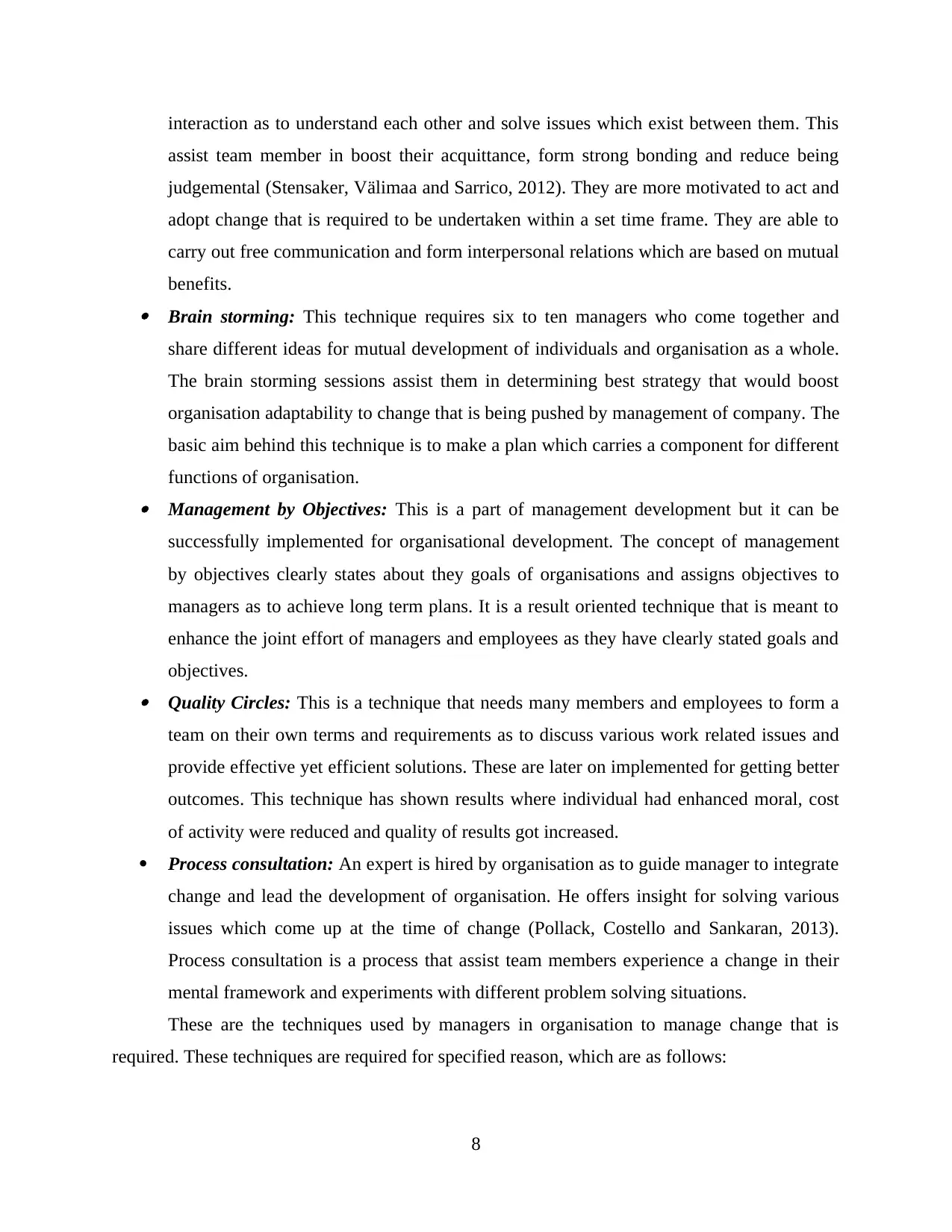
interaction as to understand each other and solve issues which exist between them. This
assist team member in boost their acquittance, form strong bonding and reduce being
judgemental (Stensaker, Välimaa and Sarrico, 2012). They are more motivated to act and
adopt change that is required to be undertaken within a set time frame. They are able to
carry out free communication and form interpersonal relations which are based on mutual
benefits. Brain storming: This technique requires six to ten managers who come together and
share different ideas for mutual development of individuals and organisation as a whole.
The brain storming sessions assist them in determining best strategy that would boost
organisation adaptability to change that is being pushed by management of company. The
basic aim behind this technique is to make a plan which carries a component for different
functions of organisation. Management by Objectives: This is a part of management development but it can be
successfully implemented for organisational development. The concept of management
by objectives clearly states about they goals of organisations and assigns objectives to
managers as to achieve long term plans. It is a result oriented technique that is meant to
enhance the joint effort of managers and employees as they have clearly stated goals and
objectives. Quality Circles: This is a technique that needs many members and employees to form a
team on their own terms and requirements as to discuss various work related issues and
provide effective yet efficient solutions. These are later on implemented for getting better
outcomes. This technique has shown results where individual had enhanced moral, cost
of activity were reduced and quality of results got increased.
Process consultation: An expert is hired by organisation as to guide manager to integrate
change and lead the development of organisation. He offers insight for solving various
issues which come up at the time of change (Pollack, Costello and Sankaran, 2013).
Process consultation is a process that assist team members experience a change in their
mental framework and experiments with different problem solving situations.
These are the techniques used by managers in organisation to manage change that is
required. These techniques are required for specified reason, which are as follows:
8
assist team member in boost their acquittance, form strong bonding and reduce being
judgemental (Stensaker, Välimaa and Sarrico, 2012). They are more motivated to act and
adopt change that is required to be undertaken within a set time frame. They are able to
carry out free communication and form interpersonal relations which are based on mutual
benefits. Brain storming: This technique requires six to ten managers who come together and
share different ideas for mutual development of individuals and organisation as a whole.
The brain storming sessions assist them in determining best strategy that would boost
organisation adaptability to change that is being pushed by management of company. The
basic aim behind this technique is to make a plan which carries a component for different
functions of organisation. Management by Objectives: This is a part of management development but it can be
successfully implemented for organisational development. The concept of management
by objectives clearly states about they goals of organisations and assigns objectives to
managers as to achieve long term plans. It is a result oriented technique that is meant to
enhance the joint effort of managers and employees as they have clearly stated goals and
objectives. Quality Circles: This is a technique that needs many members and employees to form a
team on their own terms and requirements as to discuss various work related issues and
provide effective yet efficient solutions. These are later on implemented for getting better
outcomes. This technique has shown results where individual had enhanced moral, cost
of activity were reduced and quality of results got increased.
Process consultation: An expert is hired by organisation as to guide manager to integrate
change and lead the development of organisation. He offers insight for solving various
issues which come up at the time of change (Pollack, Costello and Sankaran, 2013).
Process consultation is a process that assist team members experience a change in their
mental framework and experiments with different problem solving situations.
These are the techniques used by managers in organisation to manage change that is
required. These techniques are required for specified reason, which are as follows:
8
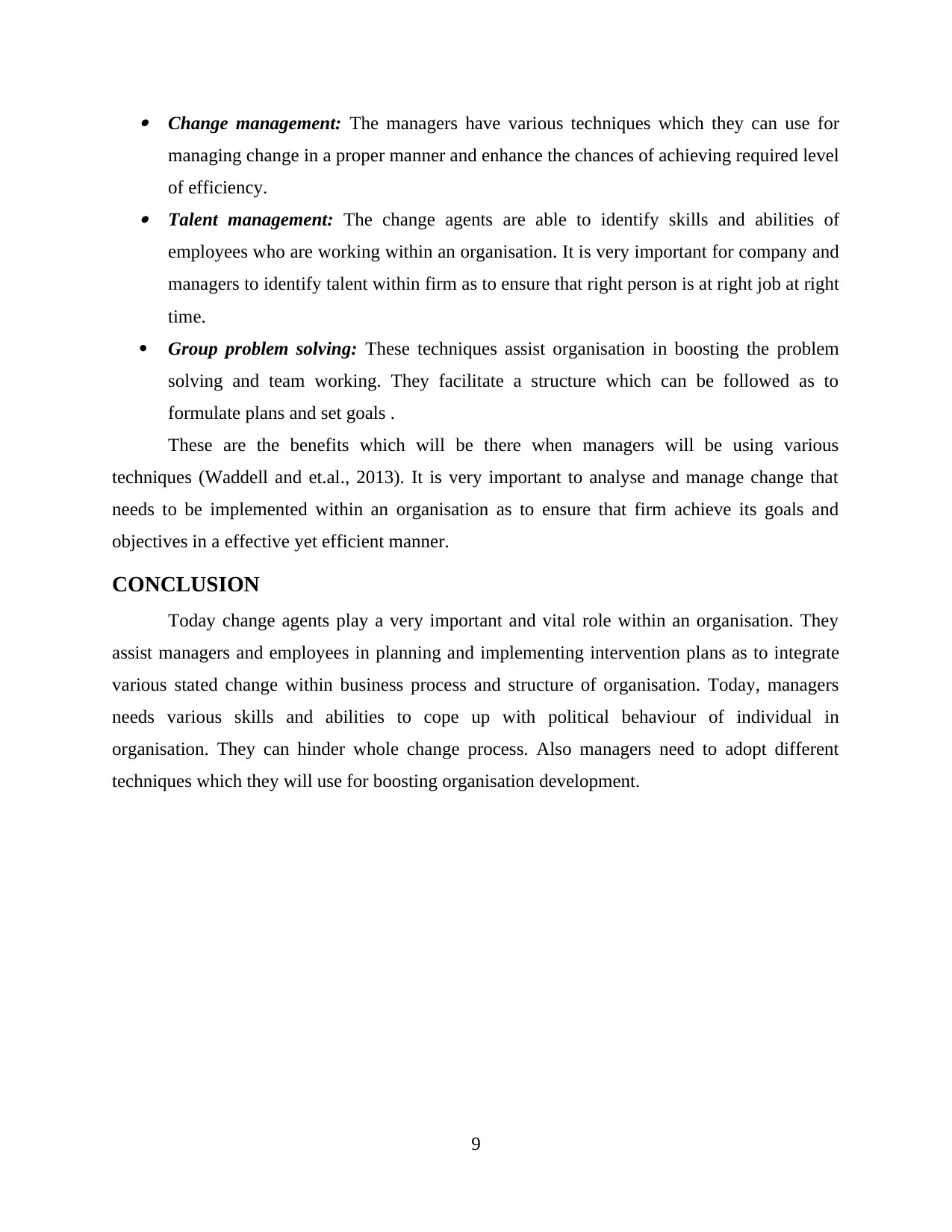
Change management: The managers have various techniques which they can use for
managing change in a proper manner and enhance the chances of achieving required level
of efficiency. Talent management: The change agents are able to identify skills and abilities of
employees who are working within an organisation. It is very important for company and
managers to identify talent within firm as to ensure that right person is at right job at right
time.
Group problem solving: These techniques assist organisation in boosting the problem
solving and team working. They facilitate a structure which can be followed as to
formulate plans and set goals .
These are the benefits which will be there when managers will be using various
techniques (Waddell and et.al., 2013). It is very important to analyse and manage change that
needs to be implemented within an organisation as to ensure that firm achieve its goals and
objectives in a effective yet efficient manner.
CONCLUSION
Today change agents play a very important and vital role within an organisation. They
assist managers and employees in planning and implementing intervention plans as to integrate
various stated change within business process and structure of organisation. Today, managers
needs various skills and abilities to cope up with political behaviour of individual in
organisation. They can hinder whole change process. Also managers need to adopt different
techniques which they will use for boosting organisation development.
9
managing change in a proper manner and enhance the chances of achieving required level
of efficiency. Talent management: The change agents are able to identify skills and abilities of
employees who are working within an organisation. It is very important for company and
managers to identify talent within firm as to ensure that right person is at right job at right
time.
Group problem solving: These techniques assist organisation in boosting the problem
solving and team working. They facilitate a structure which can be followed as to
formulate plans and set goals .
These are the benefits which will be there when managers will be using various
techniques (Waddell and et.al., 2013). It is very important to analyse and manage change that
needs to be implemented within an organisation as to ensure that firm achieve its goals and
objectives in a effective yet efficient manner.
CONCLUSION
Today change agents play a very important and vital role within an organisation. They
assist managers and employees in planning and implementing intervention plans as to integrate
various stated change within business process and structure of organisation. Today, managers
needs various skills and abilities to cope up with political behaviour of individual in
organisation. They can hinder whole change process. Also managers need to adopt different
techniques which they will use for boosting organisation development.
9
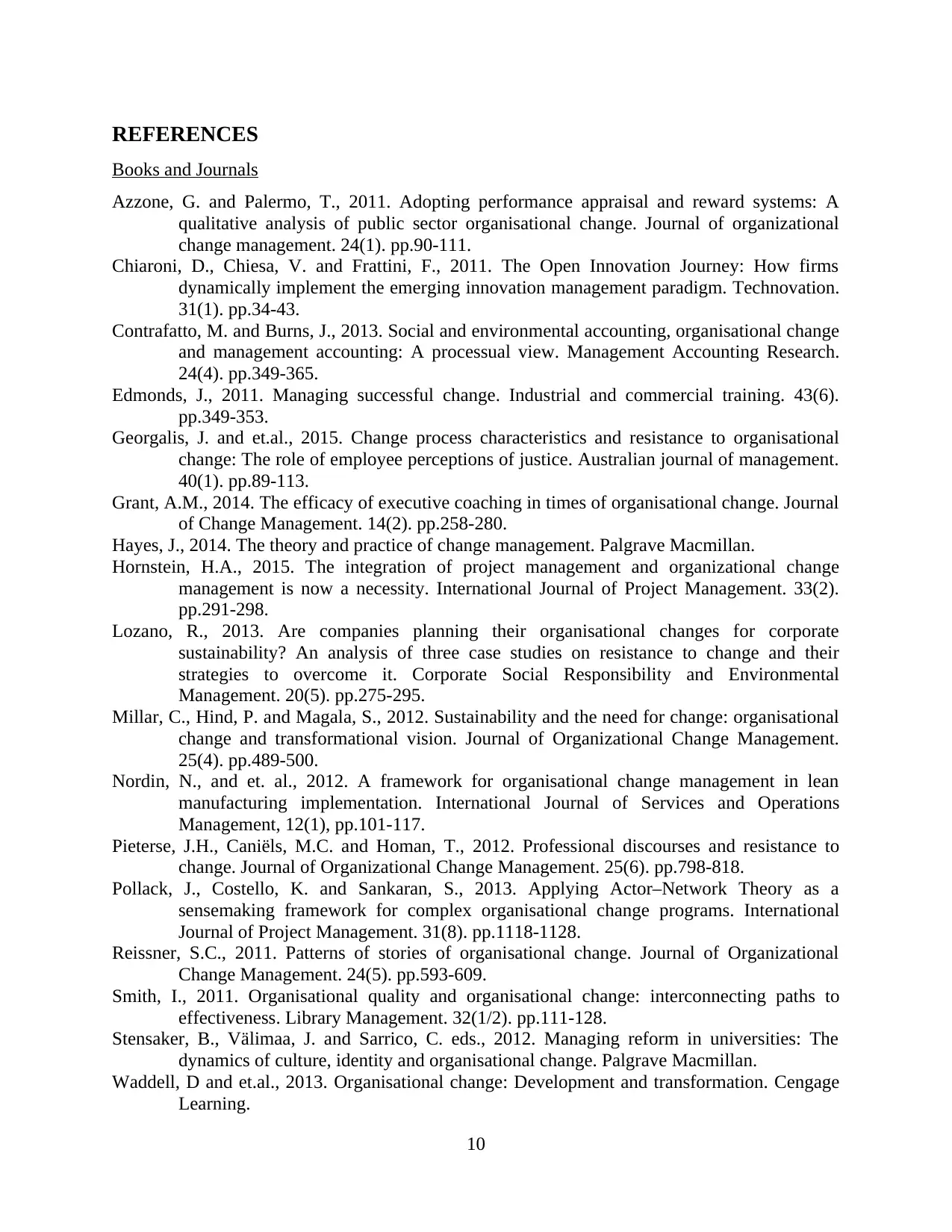
REFERENCES
Books and Journals
Azzone, G. and Palermo, T., 2011. Adopting performance appraisal and reward systems: A
qualitative analysis of public sector organisational change. Journal of organizational
change management. 24(1). pp.90-111.
Chiaroni, D., Chiesa, V. and Frattini, F., 2011. The Open Innovation Journey: How firms
dynamically implement the emerging innovation management paradigm. Technovation.
31(1). pp.34-43.
Contrafatto, M. and Burns, J., 2013. Social and environmental accounting, organisational change
and management accounting: A processual view. Management Accounting Research.
24(4). pp.349-365.
Edmonds, J., 2011. Managing successful change. Industrial and commercial training. 43(6).
pp.349-353.
Georgalis, J. and et.al., 2015. Change process characteristics and resistance to organisational
change: The role of employee perceptions of justice. Australian journal of management.
40(1). pp.89-113.
Grant, A.M., 2014. The efficacy of executive coaching in times of organisational change. Journal
of Change Management. 14(2). pp.258-280.
Hayes, J., 2014. The theory and practice of change management. Palgrave Macmillan.
Hornstein, H.A., 2015. The integration of project management and organizational change
management is now a necessity. International Journal of Project Management. 33(2).
pp.291-298.
Lozano, R., 2013. Are companies planning their organisational changes for corporate
sustainability? An analysis of three case studies on resistance to change and their
strategies to overcome it. Corporate Social Responsibility and Environmental
Management. 20(5). pp.275-295.
Millar, C., Hind, P. and Magala, S., 2012. Sustainability and the need for change: organisational
change and transformational vision. Journal of Organizational Change Management.
25(4). pp.489-500.
Nordin, N., and et. al., 2012. A framework for organisational change management in lean
manufacturing implementation. International Journal of Services and Operations
Management, 12(1), pp.101-117.
Pieterse, J.H., Caniëls, M.C. and Homan, T., 2012. Professional discourses and resistance to
change. Journal of Organizational Change Management. 25(6). pp.798-818.
Pollack, J., Costello, K. and Sankaran, S., 2013. Applying Actor–Network Theory as a
sensemaking framework for complex organisational change programs. International
Journal of Project Management. 31(8). pp.1118-1128.
Reissner, S.C., 2011. Patterns of stories of organisational change. Journal of Organizational
Change Management. 24(5). pp.593-609.
Smith, I., 2011. Organisational quality and organisational change: interconnecting paths to
effectiveness. Library Management. 32(1/2). pp.111-128.
Stensaker, B., Välimaa, J. and Sarrico, C. eds., 2012. Managing reform in universities: The
dynamics of culture, identity and organisational change. Palgrave Macmillan.
Waddell, D and et.al., 2013. Organisational change: Development and transformation. Cengage
Learning.
10
Books and Journals
Azzone, G. and Palermo, T., 2011. Adopting performance appraisal and reward systems: A
qualitative analysis of public sector organisational change. Journal of organizational
change management. 24(1). pp.90-111.
Chiaroni, D., Chiesa, V. and Frattini, F., 2011. The Open Innovation Journey: How firms
dynamically implement the emerging innovation management paradigm. Technovation.
31(1). pp.34-43.
Contrafatto, M. and Burns, J., 2013. Social and environmental accounting, organisational change
and management accounting: A processual view. Management Accounting Research.
24(4). pp.349-365.
Edmonds, J., 2011. Managing successful change. Industrial and commercial training. 43(6).
pp.349-353.
Georgalis, J. and et.al., 2015. Change process characteristics and resistance to organisational
change: The role of employee perceptions of justice. Australian journal of management.
40(1). pp.89-113.
Grant, A.M., 2014. The efficacy of executive coaching in times of organisational change. Journal
of Change Management. 14(2). pp.258-280.
Hayes, J., 2014. The theory and practice of change management. Palgrave Macmillan.
Hornstein, H.A., 2015. The integration of project management and organizational change
management is now a necessity. International Journal of Project Management. 33(2).
pp.291-298.
Lozano, R., 2013. Are companies planning their organisational changes for corporate
sustainability? An analysis of three case studies on resistance to change and their
strategies to overcome it. Corporate Social Responsibility and Environmental
Management. 20(5). pp.275-295.
Millar, C., Hind, P. and Magala, S., 2012. Sustainability and the need for change: organisational
change and transformational vision. Journal of Organizational Change Management.
25(4). pp.489-500.
Nordin, N., and et. al., 2012. A framework for organisational change management in lean
manufacturing implementation. International Journal of Services and Operations
Management, 12(1), pp.101-117.
Pieterse, J.H., Caniëls, M.C. and Homan, T., 2012. Professional discourses and resistance to
change. Journal of Organizational Change Management. 25(6). pp.798-818.
Pollack, J., Costello, K. and Sankaran, S., 2013. Applying Actor–Network Theory as a
sensemaking framework for complex organisational change programs. International
Journal of Project Management. 31(8). pp.1118-1128.
Reissner, S.C., 2011. Patterns of stories of organisational change. Journal of Organizational
Change Management. 24(5). pp.593-609.
Smith, I., 2011. Organisational quality and organisational change: interconnecting paths to
effectiveness. Library Management. 32(1/2). pp.111-128.
Stensaker, B., Välimaa, J. and Sarrico, C. eds., 2012. Managing reform in universities: The
dynamics of culture, identity and organisational change. Palgrave Macmillan.
Waddell, D and et.al., 2013. Organisational change: Development and transformation. Cengage
Learning.
10
Paraphrase This Document
Need a fresh take? Get an instant paraphrase of this document with our AI Paraphraser
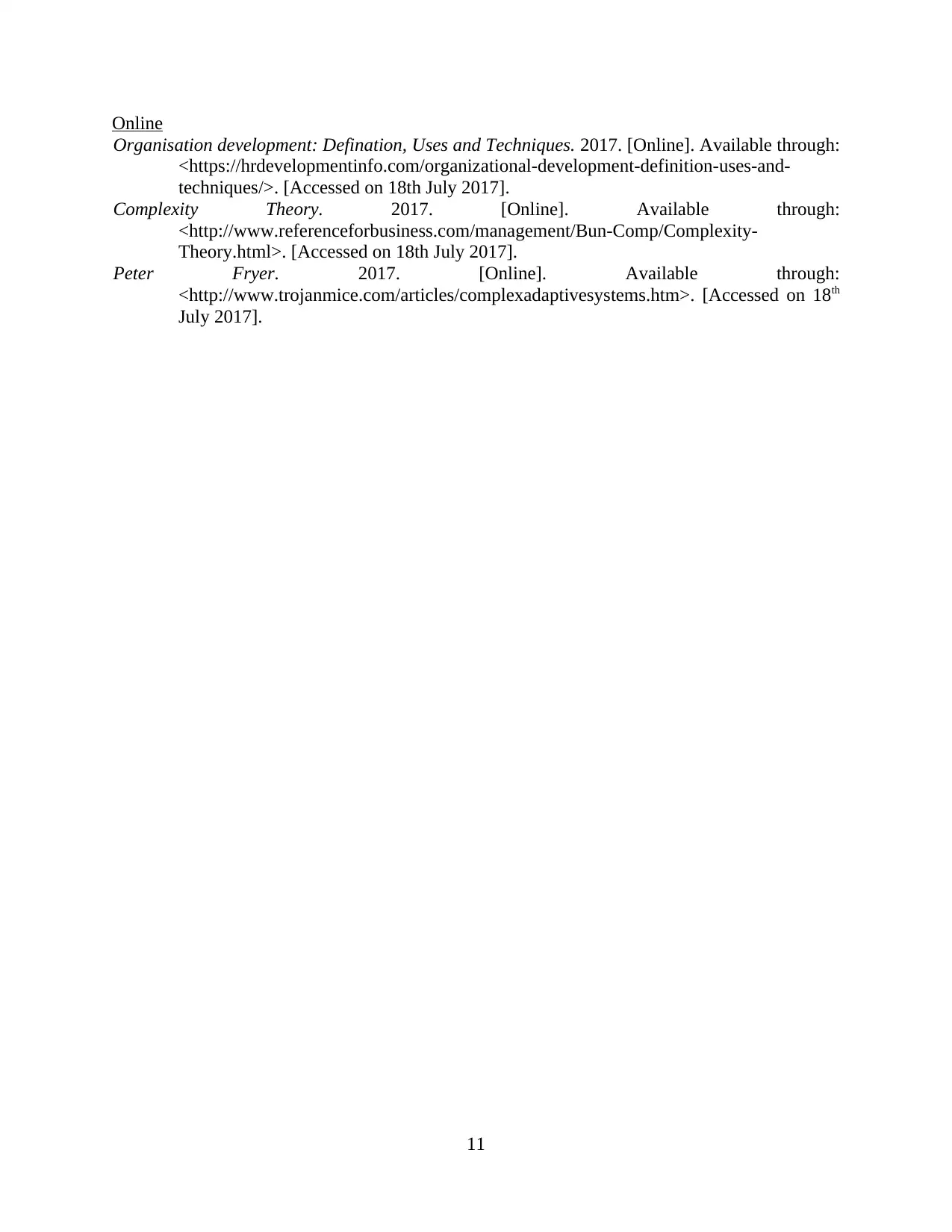
Online
Organisation development: Defination, Uses and Techniques. 2017. [Online]. Available through:
<https://hrdevelopmentinfo.com/organizational-development-definition-uses-and-
techniques/>. [Accessed on 18th July 2017].
Complexity Theory. 2017. [Online]. Available through:
<http://www.referenceforbusiness.com/management/Bun-Comp/Complexity-
Theory.html>. [Accessed on 18th July 2017].
Peter Fryer. 2017. [Online]. Available through:
<http://www.trojanmice.com/articles/complexadaptivesystems.htm>. [Accessed on 18th
July 2017].
11
Organisation development: Defination, Uses and Techniques. 2017. [Online]. Available through:
<https://hrdevelopmentinfo.com/organizational-development-definition-uses-and-
techniques/>. [Accessed on 18th July 2017].
Complexity Theory. 2017. [Online]. Available through:
<http://www.referenceforbusiness.com/management/Bun-Comp/Complexity-
Theory.html>. [Accessed on 18th July 2017].
Peter Fryer. 2017. [Online]. Available through:
<http://www.trojanmice.com/articles/complexadaptivesystems.htm>. [Accessed on 18th
July 2017].
11
1 out of 14
Related Documents
Your All-in-One AI-Powered Toolkit for Academic Success.
+13062052269
info@desklib.com
Available 24*7 on WhatsApp / Email
![[object Object]](/_next/static/media/star-bottom.7253800d.svg)
Unlock your academic potential
© 2024 | Zucol Services PVT LTD | All rights reserved.




